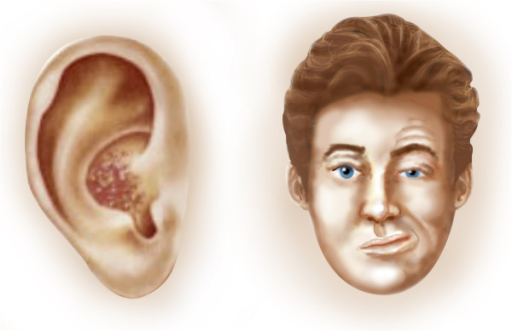Ramsay Hunt syndrome (RHS), also known as herpes zoster oticus, is a rare neurological disorder characterized by a painful rash around the ear, on the face, or on the mouth. It occurs when the varicella-zoster virus (the same virus that causes chickenpox and shingles) infects the facial nerve near one of your ears. In addition to the rash, it can cause facial paralysis and hearing loss in the affected ear.
Symptoms
- Rash: Painful, red rash with fluid-filled blisters on, in, and around one ear.
- Facial Weakness: Weakness or paralysis on the same side of the face as the affected ear.
- Ear Pain: Severe pain in the ear.
- Hearing Loss: Hearing loss or ringing (tinnitus) in one ear.
- Vertigo: Sensation of spinning or moving.
- Altered Taste: Loss of taste or changes in taste sensation on the front two-thirds of the tongue.
- Dry Mouth and Eyes: Dryness in the mouth and eyes.
Causes
Ramsay Hunt syndrome is caused by the reactivation of the varicella-zoster virus, which remains dormant in your body after you have had chickenpox. When the virus reactivates, it can affect the facial nerve, leading to the symptoms of RHS.
Treatment
- Antiviral Medications: Drugs such as acyclovir, famciclovir, or valacyclovir to combat the virus.
- Corticosteroids: Such as prednisone to reduce inflammation and swelling.
- Pain Relievers: Over-the-counter pain relievers like ibuprofen or acetaminophen, and sometimes stronger prescription pain medications.
- Anti-anxiety Medications: To help relieve vertigo.
- Physical Therapy: To help improve facial muscle strength and coordination.
- Moisturizing Eye Drops: If the eye is affected and does not close completely.
Prevention
- Shingles Vaccine: Getting vaccinated against shingles (herpes zoster) can reduce the risk of developing Ramsay Hunt syndrome. The vaccine is recommended for adults aged 50 and older.
- Prompt Treatment of Chickenpox and Shingles: Early treatment of these conditions can help reduce complications.
Early diagnosis and treatment are crucial for Ramsay Hunt syndrome to improve the chances of a full recovery and to minimize complications. If you experience the symptoms associated with RHS, seek medical attention promptly.

































